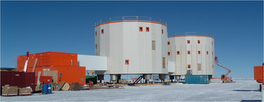What is the International Polar Year?
 The International Polar Year is a large scientific programme focused on the Arctic and the Antarctic from March 2007 to March 2009.
The International Polar Year is a large scientific programme focused on the Arctic and the Antarctic from March 2007 to March 2009.
The environmental rigors of working in the polar regions make it neigh impossible for isolated experiments to take place. One of the advantages of working at the poles during the International Polar Year is the number of other people out there at the same time, the greater amount of logistics sharing that can happen, the improved safety conditions. Another advantage is that different groups can run similar experiments in different regions at the same time. The combination of data from these different experiments can lead to results that are far greater than the sum of the results of each experiment taken individually.IPY, organized through the International Council for Science (ICSU) and the World Meteorological Organization (WMO), is actually the fourth polar year, following those in 1882-3, 1932-3, and 1957-8.
In order to have full and equal coverage of both the Arctic and the Antarctic, IPY 2007-8 covers two full annual cycles from March 2007 to March 2009 and will involve over 200 projects, with thousands of scientists from over 60 nations examining a wide range of physical, biological and social research topics.
It is also an unprecedented opportunity to demonstrate, follow, and get involved with, cutting edge science in real-time.
Cooperation and collaboration, between scientists of different nationalities and disciplines, and between their respective Polar agencies, are key to this venture.




No comments:
Post a Comment